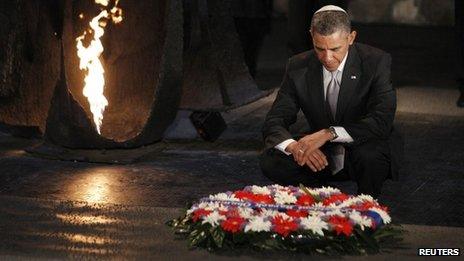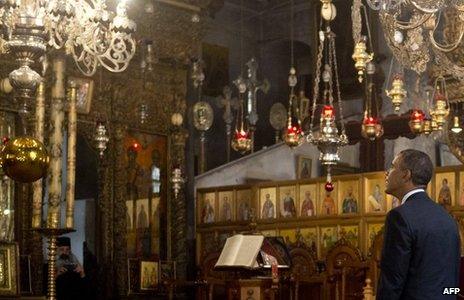Obama tours symbolic sites in Israel and West Bank
- Published

Wearing a kippah, Mr Obama laid a wreath near Yad Vashem's eternal flame
US President Barack Obama has concluded his trip to Israel and the West Bank by paying his respects to victims of the Holocaust and visiting Bethlehem.
Mr Obama went to the Yad Vashem museum after seeing the graves of Theodor Herzl, the founder of modern Zionism, and former Israeli PM Yitzhak Rabin.
He later toured Bethlehem's Church of the Nativity and and flew to Amman for talks with Jordan's King Abdullah.
On Thursday, Mr Obama urged Israelis and Palestinians to resume peace talks.
The president told an audience of some 2,000 young Israelis in Jerusalem that they could be "the generation that permanently secures the Zionist dream" or "face growing challenges to its future".
"The only way for Israel to endure and thrive as a Jewish and democratic state is through the realisation of an independent and viable Palestine," he warned.
Hours earlier, after holding talks with Palestinian Authority President Mahmoud Abbas in Ramallah, he urged Palestinians to return to the negotiating table even if Israel did not meet their condition of halting Jewish settlement construction.
"If we're going to succeed, part of what we're going to have to do is to get out of some of the formulas and habits that have blocked progress for so long," he said. "Both sides are going to have to think anew."
About 500,000 Jews live in more than 100 settlements built since the 1967 occupation of the West Bank and East Jerusalem. The settlements are considered illegal under international law, though Israel disputes this.
Sandstorm
Mr Obama began his third and final day in Israel by travelling to the grave of Theodore Herzl, who died in 1904 before his dream of a Jewish homeland was realised.
Accompanied by Israeli President Shimon Peres and Prime Minister Benjamin Netanyahu, he laid a wreath and placed a small rock on the headstone, a Jewish custom.
"It is humbling and inspiring to visit and remember the visionary who began the remarkable establishment of the State of Israel,'' he wrote in the visitors' book. "May our two countries possess the same vision and will to secure peace and prosperity for future generations.''
Mr Obama then walked to the grave of Yitzhak Rabin, who was assassinated by a right-wing extremist after a peace rally in support of the Oslo Accords in 1995.
He again laid a wreath and placed a rock on the headstone, and reportedly told Rabin's children and grandchildren that he had been "a great man", adding: "Sometimes it is harder to embark on peace than to embark on war."
Mr Obama later visited the Yad Vashem Holocaust memorial, which he said illustrated the depravity to which man could sink but also served as a reminder of the "righteous among nations who refused to be bystanders".
"The state of Israel does not exist because of the Holocaust, but with the survival of a strong Jewish state of Israel, such a holocaust will never happen again," he added.
A sandstorm later grounded the president's helicopter, forcing him to travel from Jerusalem to Bethlehem by road following a brief lunch meeting with Mr Netanyahu.
The motorcade's route took Mr Obama through Israel's controversial West Bank barrier, Israeli security sources said. Israel says the barrier is the only way to defend against militant attacks, but Palestinians view the structure as the prelude to the annexation of occupied land.
Mr Obama was accompanied on his visit of the Church of the Nativity by President Abbas. Inside, he examined ornate gold icons as a priest read a blessing, according to the AFP news agency.

Mr Obama had to travel to the Church of the Nativity by road
The church was originally built in 399 above a cave traditionally believed to be the birthplace of Jesus and rebuilt after fire in the 6th Century. It is among the holiest sites in Christianity.
Later, Mr Obama travelled by road to Tel Aviv before flying on Air Force One to the Jordanian capital Amman, where he will dine with King Abdullah.
The two leaders are expected to discuss Jordan's struggle to cope with the influx of more than 350,000 refugees from Syria, the stalled Middle East peace process, and efforts at political reform in the kingdom.
Shortly before his departure from Israel, the White House released a statement saying Mr Netanyahu had spoken by telephone to Turkish Prime Minister Recep Tayyip Erdogan, in an attempt to repair relations.
"I am hopeful that today's exchange between the two leaders will enable them to engage in deeper co-operation on this and a range of other challenges and opportunities," Mr Obama said.